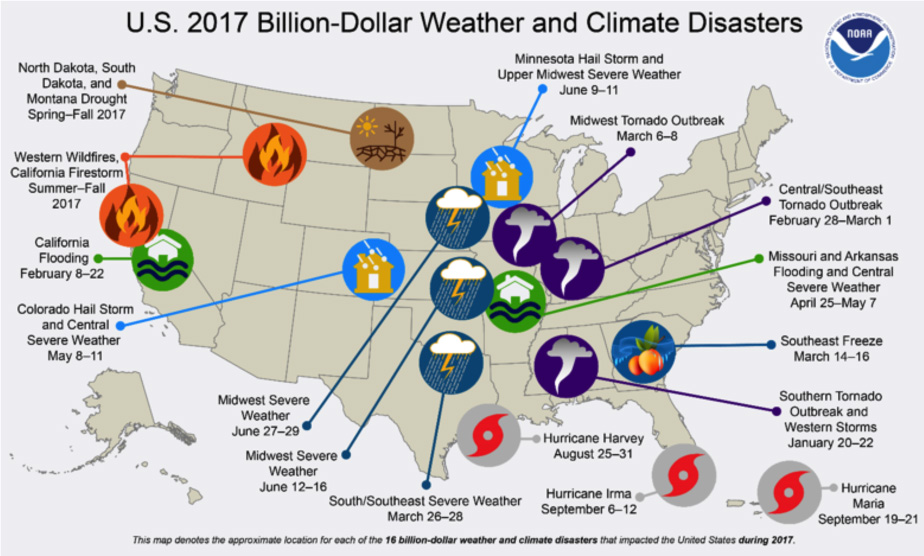Extreme weather events in the United States seemed ever-present in the media during 2017, with historic wildfires, floods, hurricanes, and droughts receiving national coverage. What was less common, however, was major TV news networks making the connection between these kinds of billion-dollar disasters and climate change for their viewers. That’s despite scientific support confirming these links, and some experts even warning that such extreme events may be “the new normal.”
The conclusion about major network coverage of climate change comes from a new report by Media Matters for America.
This report found that the major news networks — ABC, NBC, Fox, CBS, and PBS — spent a combined 260 minutes covering climate change in 2017 on their evening news and Sunday morning talk shows. The report does not include coverage from cable news outlets. While CBS and PBS spent more time on the issue than the rest of the networks, they were also the only ones to feature guests who outright denied the overwhelming scientific consensus around human-caused climate change.
For example, an October 10 edition of PBS NewsHour hosted notorious coal executive Bob Murray of Murray Coal, who made the claim that “I listen to 4,000 scientists … who tell me that mankind is not affecting climate change.” Murray’s interviewer did not question or correct his erroneous claims, and presented Murray’s position as one of two “sides” along with former U.S. Environmental Protection Agency Administrator Gina McCarthy.
Climate Change and Trump
Up from a dismal 50 minutes of total coverage in 2016, last year’s TV news attention on climate change actually rarely discussed extreme weather events — or greenhouse gas emissions, advances in climate science, or much besides the Trump administration’s actions and statements. In fact, the networks only devoted a combined 12 total segments to discussing the link between extreme weather and climate change, and two of those segments were discussing the links between climate change and hurricanes.
The networks, combined, also had four segments on public health issues related to climate change, three on economics and climate change, and just two which discussed the national security issues associated with climate change. There is some overlap in the numbers, as some issues were discussed in the same segments.
Instead, the lion’s share of the climate-related coverage — 205 of the 260 total minutes — was spent talking about Donald Trump and his administration’s actions on climate change and environmental policies.
Of all the network broadcasts, PBS devoted more segments than any other network to the Trump administration’s decision to withdraw from the Paris climate accord, with CBS coming in a very close second. PBS spent far more airtime discussing the administration’s rollback of environmental protections than the other four networks combined. Notably, none of the networks devoted a single segment last year to covering the climate implications of the Dakota Access or Keystone XL pipelines, which climate activists have fought vigorously and on which Trump issued decisions last year.
The report also mentions that nearly one-third of the broadcasts that mentioned Trump’s infamous 2012 tweet calling climate change is a Chinese “hoax” did not bother to refute the president’s claims.
Billion Dollar Disasters
According to estimates, 2017’s extreme weather and climate disasters in the United States cost the country more than $300 billion. Since 1980, there have been 219 weather and climate catastrophes that have carried a price tag of over $1 billion a piece, according to the government’s own calculations. Between the more than a thousand deaths from natural disasters in the United States last year (mostly due to Hurricane Maria) and the astronomical price tag, it is obvious that major network coverage could have gone far deeper in reporting the context and connections to climate change.
Mainstream media’s overall failure to mention climate change in the context of extreme weather events helps prevent the public from linking the two.
Climate change has far more impacts than just rising temperatures, and until broadcasters begin explaining its links to human impacts, environmental damage, and extreme weather, too many people will be left with only half of the story.
Main image: This map depicts the general location of the sixteen weather and climate disasters assessed to cause at least one billion dollars in direct damages during 2017. Credit: Climate.gov, public domain
Subscribe to our newsletter
Stay up to date with DeSmog news and alerts






